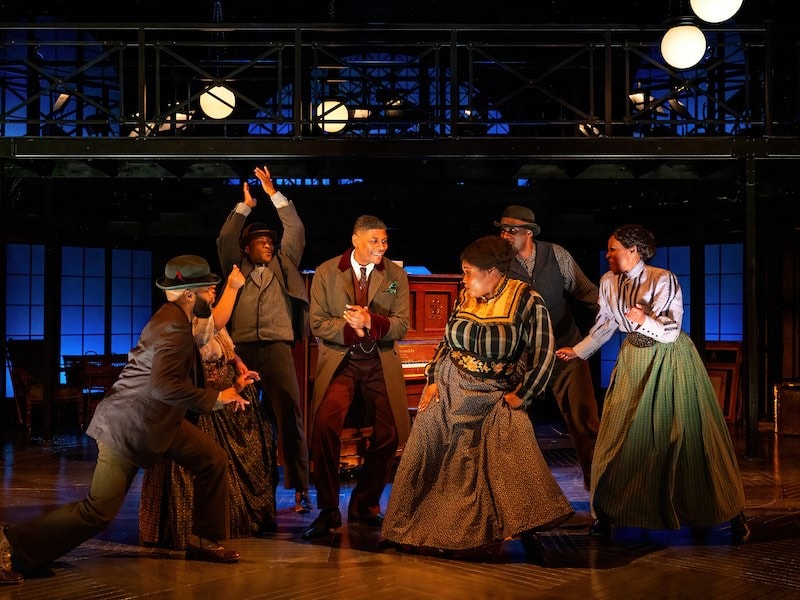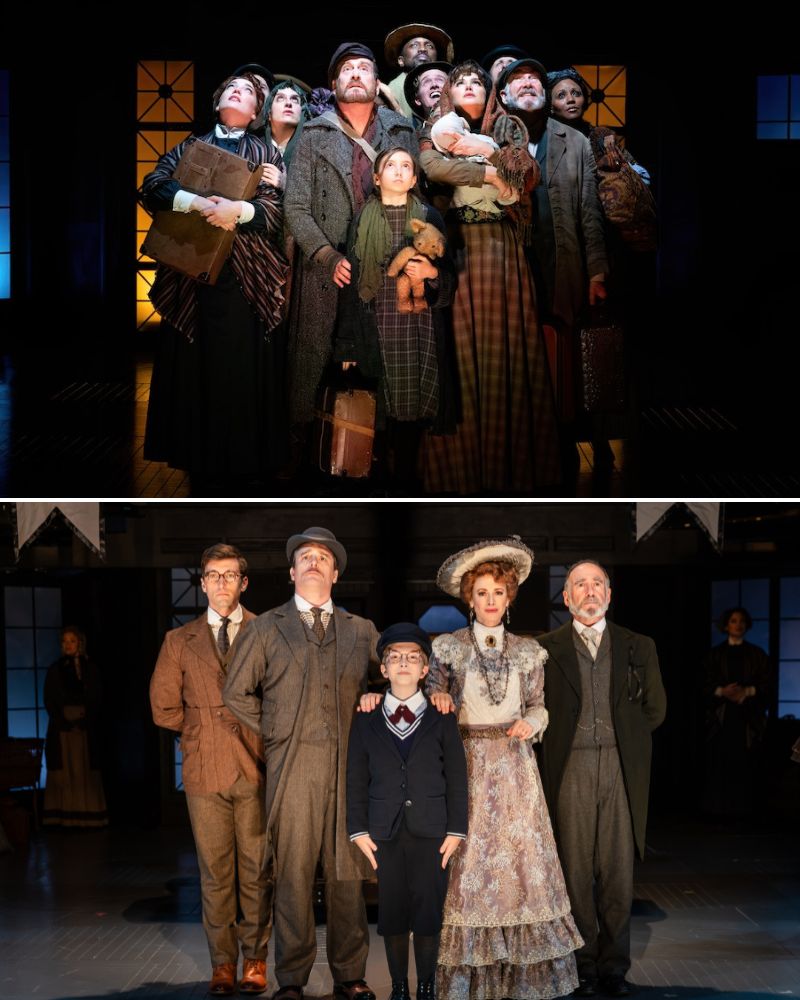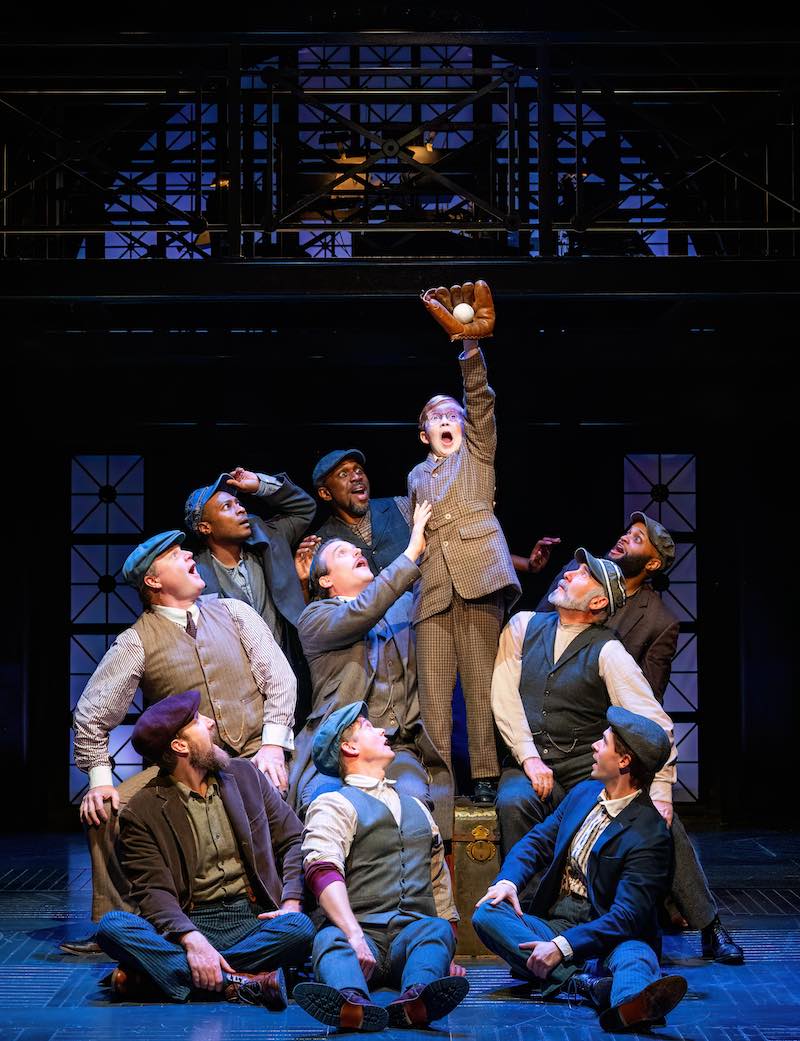Twenty-five years after its Broadway debut, the iconic musical Ragtime has been revived at Signature Theatre. Kudos to director Matthew Gardiner for undertaking a supremely ambitious work brimming with all that was best and worst about America’s Gilded Age: hope and despair, opportunity and savage repression, astonishing technological breakthroughs, and blighted lives. It’s a tall order for a small, intimate theater.
As in the original version, the production values in the Signature production aim for the sky. Lee Savage’s brawny metallic set provides an inventive backdrop to the musical’s quick-paced scenes. Some 16 musicians under the direction of Jon Kalbfleisch play in front of gorgeous arches reminiscent of New York’s old Pennsylvania Station. Costumes by Erik Teague, from J. Pierpont Morgan’s enormous fur-collared frock coat to the raggedy garments that swathed recent immigrants, paint vivid portraits of the bold and the benighted 30-plus characters that animate this play. Excellent singers bring Stephen Flaherty’s music and Lynn Ahrens’ lyrics to life, despite being overpowered on occasion by the orchestra.

E.L. Doctorow’s wildly popular novel, published just before America’s Bicentennial, was successfully translated to Broadway in 1998 and revived in 2009. Regional productions have been staged during this 25th-anniversary year, and a concert version with many of the original cast is in the works.
The plot centers on three families, each representing different tiers of American society at the turn of the 20th century. Mother, Father, Grandfather, the Little Boy, and Mother’s Younger Brother live in a New Rochelle, New York, Victorian bubble of prosperity. Just a few miles yet a world away in Harlem, the suave Black pianist Coalhouse Walker Jr. experiments with a new form of syncopation that will usher in the Jazz Age. Rising in the musical world, Coalhouse has purchased America’s most glittery sign of success, a Model T. The spiffy car is Coalhouse’s greatest pride and also proves to be his undoing. A penniless Jewish immigrant, Tateh, arrives in New York with his Little Girl, searching for a new and better life. With a pair of scissors and black paper, he supports her by cutting silhouettes for passersby on a city street.
The fictional families are joined by real-life contemporary celebrities, firebrands, and captains of industry, American style. Illusionist Harry Houdini (Edward L. Simon) and the showgirl Evelyn Nesbit (Maria Rizzo) are pop culture icons. The grumpy Morgan (Todd Scofield) and a robotic Henry Ford (Douglas Ullman Jr.) model success. Activist Emma Goldman (a particularly effective, kinetic Dani Stoller) stirs the masses to fight for better working conditions. The thundering Booker T. Washington (Tobias Young) provides a moral compass for the smoldering Coalhouse.
A rousing ensemble number, “Ragtime,” compactly introduces us to virtually the entire cast and the show’s overarching themes. Over the next two and one-half hours, the lives of all three families become intertwined, despite the nearly insuperable barriers of class, religion, and race.

With such weighty themes, the genius of the show is how neatly the action is compressed into a series of deft scenes and some memorable songs that drive the narrative forward at breakneck speed. Yet the quick pace, especially in the first act, reveals the musical’s weaknesses.
First, it moves along by leaning heavily on obvious symbols of good and evil. There is nothing remotely subtle about its messages.
Second, it becomes difficult to build empathy with characters who are so quickly sketched. Some of the actors are given a bit more to do and succeed in lessening the emotional gap between the players and the audience. Mother, movingly played by Teal Wicks, engages us almost instantly with her empathy and capacity for change. Her show-stopping solo, “Back to Before,” blooms with newfound clarity and resolve. Mother’s evolving relationship with Tateh, in an equally strong performance by Bobby Smith, builds believable chemistry along with a new, blended family. Their duet, “Our Children,” is achingly tender.
Despite their beautifully sung anthem, “Wheels of a Dream,” the relationship between Coalhouse (Nkrumah Gatling) and Sarah (Awa Sal Secka) never fully develops as the rightful centerpiece of the show. Their scant scenes fly by too fast, without enough moments of connection. When their tragedies occur, we feel we never really knew them as a couple.

Along with beautiful ballads, Ragtime’s new rhythms allude to forces that were changing American society in profound ways. Again, there’s nothing subtle about the musical themes that permeate the score. After a while, their repetition becomes a bit cloying. Thank goodness for the timeouts, literally. When the raw newness of the real world overwhelms, what better escape than a ballgame?! “What a Game,” Father’s (Bill English) foray to the ballpark with his weirdly clairvoyant Little Boy, wonderfully played by the luminous Matthew Lamb, is a delightfully leveling episode in a show loaded with Americana.
Signature’s production is laudable on many levels. But the archetypes deftly crafted in 1998 of Blacks, Jews, WASPS, and plutocrats now appear more as flattened stereotypes. A story that was revelatory 25 years ago now seems more like a relic. And yet, the violent race and class struggles that propel Ragtime are still at work in our present day, eroding the American dream even as we continue to believe in our exceptionalism. For that reason, Ragtime’s revival provides a searing reminder of where we came from, and where we are today.
Running time: Two hours and 45 minutes with one 15-minute intermission.
Ragtime plays through January 7, 2024, in the MAX Theatre at Signature Theatre, 4200 Campbell Avenue, Arlington, VA. For tickets ($40–$123), call (703) 820-9771 or purchase online. Information about ticket discounts is available here.
The program for Ragtime is online here.
Closed captions are available via the GalaPro app.
COVID Safety: Masks are always optional but strongly encouraged in the lobby and other public areas of the building. Face masks are required inside the performance spaces Masks November 5 at 2 p.m., November 14 at 7:30 p.m., and January 5, 2024, at 8 p.m.. Face masks are optional but strongly encouraged inside the performance spaces at other performances. Signature’s COVID Safety Measures can be found here.





There is only one word that accurately sums up this review. Goofy. Like the Disney character but less affable and dumber.
This is the dumbest review I’ve ever read on this website
The reviewer has made a big mistake. The play is about the world in New York City more than 100 years ago, not 25 years ago. She is calling common views of religious, ethnic, class, abd racial groups stereotypical based on 2023. The play is about New York before WWI. It is not meant to be revelatory. It is history.